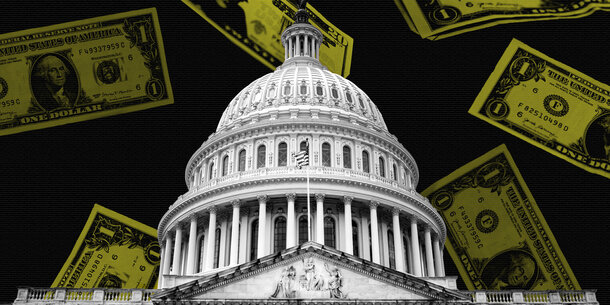You’re reading The Briefing, Michael Waldman’s weekly newsletter. Click here to receive it in your inbox.
The presidency has seen its fair share of political retribution and self-dealing. John Adams prosecuted political dissenters. Richard Nixon had an enemies list. Joe Biden pardoned his son.
All that may pale in comparison to what we’ve seen over the past few days.
There was President Trump’s public demand that the attorney general prosecute New York Attorney General Letitia James, former FBI Director James Comey, and Sen. Adam Schiff (D-CA). When a top federal prosecutor did not bring charges against James and Comey, Trump pushed him out.
Meanwhile, there was the MSNBC story of Tom Homan, now the immigration “tsar,” videotaped accepting $50,000 from undercover FBI agents last year in a bag from the fast-casual chain Cava. (I’ll have a bowl of greens, please.) Trump officials shut down the investigation. Homan, yesterday, did not deny the handoff but insisted, “I did nothing criminal.”
Not to mention the New York Times report about a White House deal with the United Arab Emirates and a $2 billion investment in the Trump family crypto firm. And a new Brennan Center analysis exposing how donors have received pardons and special favors in recent months.
Some 50 years ago, Watergate featured bags of cash and the firing of a prosecutor. That took two years to unfold, not a week.
Often, but not inevitably, reform follows scandal. After Watergate, Congress passed legislation to curb abuse and constrain the imperial presidency. They ranged from special prosecutor laws to new budget powers for Congress. Nixon’s Republican successor Gerald Ford established a tradition that the Justice Department should have considerable independence in order to avoid a repeat of political prosecutions.
A half-century eroded those constraints. The Supreme Court gutted the campaign finance laws and narrowed the definition of bribery. During Trump’s first term, it became clear that the guardrails were flimsy. In this term, they might as well not exist.
Will these newest transgressions become a major issue? Endless cacophony can distract from scandal. Who can even keep track? But voters do seem to understand the link between self-dealing, abuse of power, and rights violated. In just a few months, corruption has quickly emerged as a hot issue again.
Yet it won’t be enough for politicians to merely orate about restoring the rule of law. Leary voters think, “Everyone does it.” The only way to overcome that skepticism is with action.
That’s why it is encouraging that some lawmakers have begun to stir.
Last week, Schiff reintroduced the Protecting Our Democracy Act. Passed by the House in 2021, the bill would limit contacts between the White House and the Justice Department. It would bring transparency to the pardon process. It would create clear standards for enforcing the Constitution’s emoluments clauses — the provisions, so important to the founders, that prevent presidents from receiving bribes from foreign governments. It would restore Congress’s role as a check against the kind of presidential abuse of emergency powers that has become a hallmark of this administration. And it would bolster Congress’s oversight role and reinforce its power over the purse. It was a strong measure to curb abuse of power.
The bill draws on key recommendations from a 2017 Brennan Center nonpartisan task force — led by former U.S. Attorney Preet Bharara and former New Jersey Gov. Christine Todd Whitman — and from Brennan Center recommendations for reforming the National Emergencies Act.
This reintroduced bill is a promising start. But reforms should keep evolving, growing stronger to address the magnitude of today’s new Gilded Age. One example: Tighter rules should be put in place to prevent the weaponization of the Justice Department against political enemies. It is illegal for presidents to order a tax audit of an individual, so they should not be able to order a criminal prosecution either. Perhaps individuals could be given standing to sue if they have been selectively prosecuted for political reasons.
As a reform era takes shape, we must all now grapple with a new and disturbing factor: a Supreme Court that previously constrained executive branch action through the “major questions” doctrine but now seems ever more eager to expand presidential power. After all, this administration’s impunity follows last year’s ruling giving presidents vast immunity from prosecution. Now we see the consequences of a judicially created lawless zone.
It might be tempting for those who are appalled by today’s abuses to quietly growl, but refuse to act, on the theory that they don’t want to limit their own power once they’re in. “After all, Trump did it, so why shouldn’t his successor?” That cynical take sounds savvy but is misguided.
The Protecting Our Democracy Act failed to pass even when the White House and Congress were in unified Democratic hands. Biden White House officials made it clear that they were not wild about a bill that would tie their hands even a bit. Count that as one more failure to harden the system against future abuse.
Wise constitutional constraints are not some self-defeating noblesse oblige. They are a key part of what makes our republic strong. Done right, enforced strongly, they constrain potential abuse not just now but into the future.
When (if!) this era of abuse ends, leaders from both parties will be called upon to enact new reforms to ensure this cannot happen again. Upon taking office, President Ford said that the end of the Watergate crisis was proof that “Our Constitution works” and “our great Republic is a government of laws and not of men.” We must make sure the same is true today.



